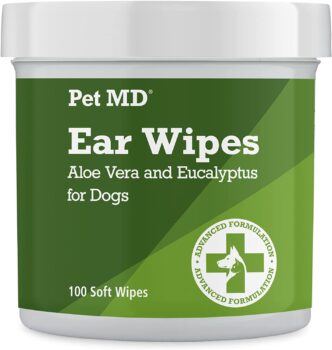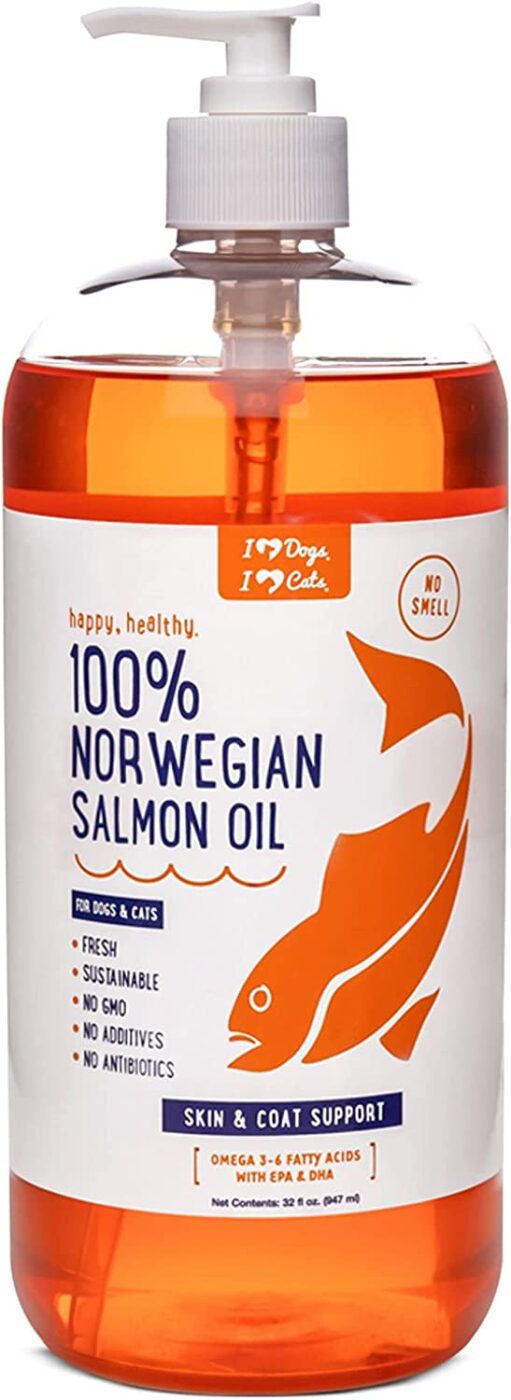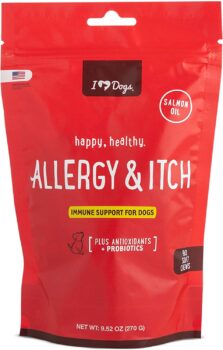Golden Retrievers are among the most popular breeds in the world. They’re friendly, intelligent, and incredibly good-natured. However, like any breed, they have their health challenges. One of the most common issues they face is ear infections. In this article, we’ll explore 11 ways to treat and prevent ear infections in Golden Retrievers. Plus, we’ll discuss how a diet rich in Omega-3 can help.

iHeartDogs is reader supported. Some of the links below may be paid affiliate links, where we receive a small commission on a product at no additional cost to you.
1. Regular Cleaning
The first and foremost prevention method is regular cleaning. This reduces the buildup of wax, debris, and bacteria, which cause infections. Use a vet-approved ear cleaning solution, and gently clean your dog’s ears once a week.
Our favorite ear cleaner is these PetMD brand ear wipes on Amazon.
2. Keep Ears Dry
Golden Retrievers love to swim. However, water in the ears can promote bacterial growth leading to infections. After bathing or swimming, make sure to dry your dog’s ears thoroughly.
3. Regular Vet Check-ups
Regular vet visits can catch infections early. Your vet can also advise you on how to clean your dog’s ears correctly and what signs of infection to look out for.
4. Proper Nutrition
A healthy diet boosts your dog’s immune system, helping to prevent infections. A diet rich in Omega-3 fatty acids is particularly beneficial as it fights allergies and inflammation, which can contribute to ear infections.
5. Omega-3 Supplementation
Omega-3 fatty acids have anti-inflammatory properties that can reduce the risk of allergies. Allergies can cause swelling and create a conducive environment for bacteria. Fish oil is an excellent source of Omega-3s.
We’re fans of this Norwegian salmon oil on Amazon. It’s a bright orangish-pink color and has no fishy smell at all due to it’s ultra high purity.
6. Allergy Management
In addition to Omega-3 supplementation, manage your dog’s allergies through appropriate food, regular grooming, and medication, as prescribed by your vet.
A few good supplements to help your dog’s allergies are apple cider vinegar, quercetin, and colostrum, all of which are found in many natural allergy supplements like this one.
7. Avoidance of Allergens
If you know your dog is allergic to specific substances, do your best to keep these out of their environment. This reduces the risk of allergic reactions and subsequent ear infections.
8. Regular Exercise
Exercise is an important part of keeping your dog healthy. Regular exercise can boost the immune system and keep the body functioning well.
9. Grooming
Regular grooming can also help prevent ear infections. Trim the hair around your Golden Retriever’s ears to allow better airflow, which reduces moisture and limits the growth of bacteria.
10. Healthy Weight
Overweight dogs are more prone to health issues, including ear infections. Keep your dog at a healthy weight with a balanced diet and regular exercise.
11. Medication as Required
If your dog has recurring ear infections, your vet may prescribe preventive medication. This should be used as directed.
By following these 11 methods, you can help keep your Golden Retriever’s ears healthy.
FAQ
Q1: How do I know if my Golden Retriever has an ear infection? A: Common signs include scratching at the ear, redness, swelling, an unpleasant smell, or discharge from the ear.
Q2: What causes ear infections in Golden Retrievers? A: Common causes include moisture in the ear, allergies, bacterial or yeast infections, and foreign bodies in the ear.
Q3: Can ear infections in Golden Retrievers be serious? A: Yes, if untreated, ear infections can lead to hearing loss or other complications.
Q4: Can I use human ear infection treatments on my dog? A: No. Always consult your vet before applying any treatment. Human medications may not be safe for your dog.
Q5: How can I apply ear drops to my Golden Retriever? A: Follow your vet’s instructions. Generally, you’ll hold the ear flap up, apply the drops, and then massage the base of the ear to distribute the medication.
Q6: Why is my Golden Retriever getting recurring ear infections? A: Recurring infections could be due to allergies, exposure to water, or an underlying health condition. Your vet can help identify the cause.
Q7: Can diet affect my dog’s ear health? A: Yes, a balanced diet boosts your dog’s immune system. Omega-3 fatty acids, in particular, can reduce inflammation and help manage allergies, reducing the risk of ear infections.
Q8: Are there breeds more prone to ear infections than Golden Retrievers? A: Breeds with floppy ears, like Golden Retrievers, are more prone to ear infections due to poor ventilation and trapping of moisture.
Q9: How often should I clean my Golden Retriever’s ears? A: It’s recommended to clean your dog’s ears once a week, but this can vary depending on your dog’s specific needs. Always follow your vet’s advice.
Q10: What should I do if I suspect my Golden Retriever has an ear infection? A: If you suspect an ear infection, consult your vet immediately. Early treatment can prevent more serious complications.
In summary, prevention is the best medicine when it comes to ear infections. A good diet rich in Omega-3, regular cleaning and grooming, and proper healthcare can all contribute to keeping your Golden Retriever’s ears healthy.



 Toledo, United States.
Toledo, United States.
